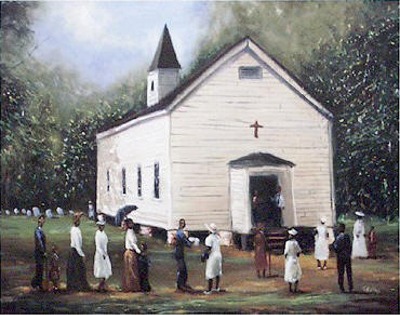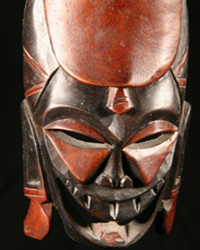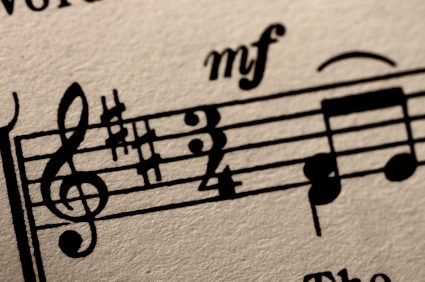|

CULTURAL RESOURCES
Sunday, March 29, 2009
Ralph Wheeler, Guest Cultural Resource Commentator
Longtime civil rights activist, resident of Oakland, CA
I. Introduction and Historical Foundation
There are numerous religious traditions and liturgical moments that exist within the African American church for which there is no clear record regarding when or how they started. Church anniversaries fall within that category. The liturgical moment of “Church Anniversary” is one of the high points of black church life. Yet, there is no settled record depicting when the first black church anniversary was held. In part, this could be due to the recognition that the black church in this country did not develop as a single unit.
Church anniversary is a time when the black church celebrates its past, while it thematically points to a vision of its future. Congregations utilize church anniversary celebrations to impart and reflect on their history, reconnect with their former members, especially those who have moved away to other cities and states, and to highlight the church's central purpose in the local community and the world.
Any serious discussion or understanding of the importance of this liturgical moment (church anniversary) must start with, at minimum, a working definition of the word “church,” and an overview of Christianity's origins among black people. To that end, we must look to the Bible and to the Continent of Africa.
II. Working Definition

Among black church laity, there sometimes exists confusion as to whether the word “church” refers to a body of believers or a physical structure. Thus, some church anniversaries, through their written histories, focus great attention on the date the congregation's first church building was constructed, or the place in which the first “meeting” of the congregation was held. Biblically speaking, this focus may be too narrow.
Harper’s Bible Dictionary defines the word “church” thusly: “church, the English translation of a Greek word (ekklesia) meaning ‘assembly’ or ‘gathering.’”1 That same dictionary indicates that the word “church” “… does not normally appear in English translations of the OT (Old Testament).”2 Further, it indicates that “… ‘church’ always denotes a group of people, either all the Christians in a city (Acts 14:23); 1Cor. 1:2; 2 Cor. 1.1) or those gathered for worship in a particular house (Rom. 16:5; 1Cor. 16:19) or all Christians in all the churches, the whole Church (Matt. 16:18; Eph. 1:22). It never signifies a building or a ‘denomination.’”3
These scriptures clearly tell us that Jesus Christ is the founder of the Christian Church and that it is composed not of brick and mortar, but of the believers who follow his commandments.
III. Remember The African Connection

The ancestors of African Americans were introduced to this fundamental Christian concept on the Continent of Africa, long before any Africans arrived in the Americas. While the exact date of Christianity’s arrival in Africa is subject to debate, it is commonly accepted by major historians that Christianity thoroughly existed in North Africa prior to the seventh century.4 Christianity arrived in West Africa much later, perhaps as late as the sixteenth century.5 West Africa supplied the Americas with most of their slaves.6 Some of these individuals and their offspring later became the initial body of believers of the black church in the United States of America.
Since that time, the American black church has grown tremendously. All over America bodies of black Christian believers have come together, communities of black Christians have merged and hundreds of thousands of church houses and meeting places have been constructed to house those believers. As such, church histories have been forged and numerous church anniversaries have been held. All of these church bodies are now part of the Church established by Christ in Matthew 16:18, when he said:
And I tell you, you are Peter, and
on this rock I will build my church
and the gates of Hades will not prevail
against it.7
This Biblical truth of Jesus’ statement is often celebrated during church anniversaries through singing of one of the black church's great hymns, “The Church's One Foundation”:
The Church's one foundation
is Jesus Christ her Lord,
She is His new creation
By water and the word;
From heave’n He came and sought her
to be His holy bride;
with His own Blood He bought her,
And for her life He died.8
IV. Memories of Anniversaries Past
I was born and raised in central Mississippi. And, until I went away to college, I had the fortune to be nurtured in a small (250-300 member) black Baptist church (Holy Ghost Missionary Baptist Church). Most of my church days there were regular, but some were extraordinary. Our church anniversary Sunday was an extraordinary day. There was nothing regular about it.
On church anniversary Sundays, we dressed better, we ate better, we sang better, we ushered better, and the preaching was much better than on our regular Sundays. Church anniversary Sunday was a special day. On that day, everybody was in good form.
Usually, several other churches were invited to our anniversary program. Since the church anniversary was special, the invited sister churches were most often represented by soloists and choirs that were born to sing. They were the highlight of our church anniversary program.
Those church anniversary services were also special because they were the only times in my home church experience that I and the other young people of the church were given concrete information about the history of our church. We learned when our church was organized and why it was organized. This information was usually written in the anniversary program.
There was one other small black Baptist church in my home town (Pleasant Green Baptist Church). Some members of the latter church, in 1897, organized our church because so many members lived in the rural parts of the area and, due to a lack of transportation, could not get to the one existing black Baptist church. Thus, our church was organized and built closer to those rural members. That little church is now 112 years old.
Church anniversary Sunday taught me that my little church and I had a real history. It taught me that God had been faithful to our congregation for a long time. It was through the lens of a church anniversary that I first came to understand my connection with the larger body of Christ.
V. A Church Anniversary Litany
The following litany may be used as a guide for developing more personalized litanies for church anniversaries for specific congregations:
Dear Lord, thank you for drawing us, as a congregation, to you to become part of your Church.
Thank you for our ancestors and those who listened to your voice and were obedient to your
call to organize this congregation for your purposes.
Help us to teach our young your ways and their history, so they will know who you are and who they can be.
Inspire us with a vision for the future and use that vision to direct the path of this congregation.
Help us to lean not on our own understanding but to lean on every promise of your Word.
Grant us the authority to conquer all divisiveness, and fill us with a desire to love each other.
Lord please protect us from all evil and from those spirits that seek to destroy the peace you have given us.
May your spirit continue to infuse our church with courage, hope and grace.
Teach us to know your voice and give us the courage to obey it.
Lord, please continue to provide your church with a light for the world. Amen.
VI. The Anniversary Committee
Most African American churches do not follow a standard formula or procedure when they develop their church anniversary programs. Many black churches do, however, utilize anniversary committees to develop and oversee their church anniversary activities. Often, these volunteer committees are appointed or organized by the church's pastor or, at least, the chairs or co-chairs of these committees are pastorally appointed. While these committees are usually given a specific charge, their work can be tempered by the age, denomination, location, and size of the congregation. The committees’ work can also be affected by what has happened during past church anniversary celebrations. Church anniversary celebrations, depending upon the church body, can range from one Sunday to an entire year, especially if the church is celebrating a milestone such as its 50th, 100th, 125th, etc., year of existence.
This list provides a general idea of what church anniversary committees typically do:
- Develop themes to reflect the church's past and the congregation’s hopes for the future;
- Decide if the celebration will be structured to focus internally or extend outward to the local community. The tone is determined by how the pastor, anniversary committees, and the congregation perceive their purpose and relationship to their community;
- Select the church anniversary program participants;
- Prepare materials chronicling the achievements of the church;
- Lead in the carrying out of fundraising efforts;
- Develop special programs/orders of worship and or brochures for the anniversary;
- Provide advertising for the celebration;
- Prepare videos, souvenir booklets, or other remembrances of the occasion; and
- Lead in providing a meal or refreshments of some type for the occasion.
VII. Church Anniversary Special Projects
The following special projects are offered to pastors, congregations, and anniversary committees for possible use during church anniversaries:
- As a project for your youth and young adults, have them create customized United States Postal Service stamps that contain pictures of the physical church and all former pastors. Information on how to do this can be obtained by going online to the USPS site and clicking on customized stamps;
- Collect church artifacts (bulletins, choir robes, pictures, albums, financial reports, newspaper articles, etc.) and create a museum styled exhibit depicting the church’s history;
- Organize a candle light service for deceased members and pastors infuse the service with songs and events from each decade or more represented by the age of your church;
- Organize a period social, tea, or banquet that covers each decade of the church’s history. Attendees should be asked to wear clothing from the respective periods and foods from those periods should be served;
- Commission the writing of a book or pamphlet that sets forth the church’s entire history;
- Develop a DVD or video that focuses on the church, its history and ministries;
- Hold a musical and include every genre of African American church music. Use this as a black history teaching tool, especially for the children and young people of the community and congregation;
- Have teachers in your congregation create a bulletin board of the pastoral history of the church. They should list at least one accomplishment of each pastor and the time frame in which the pastor served; and
- In preparation for the Church Anniversary, the Director of Christian Education, may want to consider developing a unified curriculum on the conception (Matthew 16:13-19), birth (Acts 2:1-41), and work (Acts 2:42-47) of the early church.
VIII. Church Anniversary Music

In the black church, music is perceived as a ministry. The quality of a church’s music ministry can be as powerful as the preached word. This is especially true on special days such as church anniversary Sunday. Ministers of music and choirs are keenly aware of their role in this important liturgical moment.
At some churches, anniversary choirs are organized and made responsible for the church’s anniversary music. When this is done, former choir members are sometimes recruited to return to the choir stand. Other congregations combine all of their church’s choirs, along with former choir members, to create a mass choir for the church anniversary program. Additionally, some congregations celebrate church anniversaries with musical programs. Churches with the capacity and resources even use the occasion to record CDs for the anniversary occasion.
There is no reason for any black church to believe that it has a lack of musical resources, regardless of its size or financial standing. The black church, over the years, has developed an enormous body of music to draw upon for church anniversaries. The following are three such songs that can be used to minister to congregants on church anniversary Sunday:
We’ve Come This Far by Faith
We’ve come this far by faith,
Leaning on the lord;
Trusting In His holy word,
He’s never failed me yet.
Oh can’t turn around,
We’ve come this far by faith.9
I Will Trust in the Lord
I will trust in the Lord,
I will Trust in the Lord,
I will trust in the Lord till I die.
I will trust in the Lord.
I will trust in the Lord.
I will trust in the Lord till I die.10
Glory, Glory, Hallelujah
Glory, glory hallelujah!
Since I laid my burdens down.
Glory, glory, hallelujah!
Since I laidmy burdens down.
Friends don’t treat me like they used to,
Since I laid my burdens down.
Friends don’t treat me like they used to,
Since I laid my burdens down.11
Notes
1. Achtemeier, Paul J. Harper's Bible Dictionary. San Francisco, CA: Harper & Row, 1985. p.168.
2. Ibid.
3. Ibid.
4. Franklin, John Hope and Alfred A. Moss, Jr. From Slavery To Freedom: A History of African Americans. New York, NY: Knopf, 2005. p. 27.
5. Ibid.
6. Ibid.
7. Matthew 16:8, New Revised Standard Version of the Bible
8. “The Church’s One Foundation.” African American Heritage Hymnal. Chicago, IL: GIA Publications, Inc., 2001. p. 337.
9. “We’ve Come This Far by Faith.” African American Heritage Hymnal. p. 412.
10. “I will Trust in the Lord.” African American Heritage Hymnal. p. 391.
11. “Glory, Glory, Hallelujah.” African American Heritage Hymnal. p. 500.
|